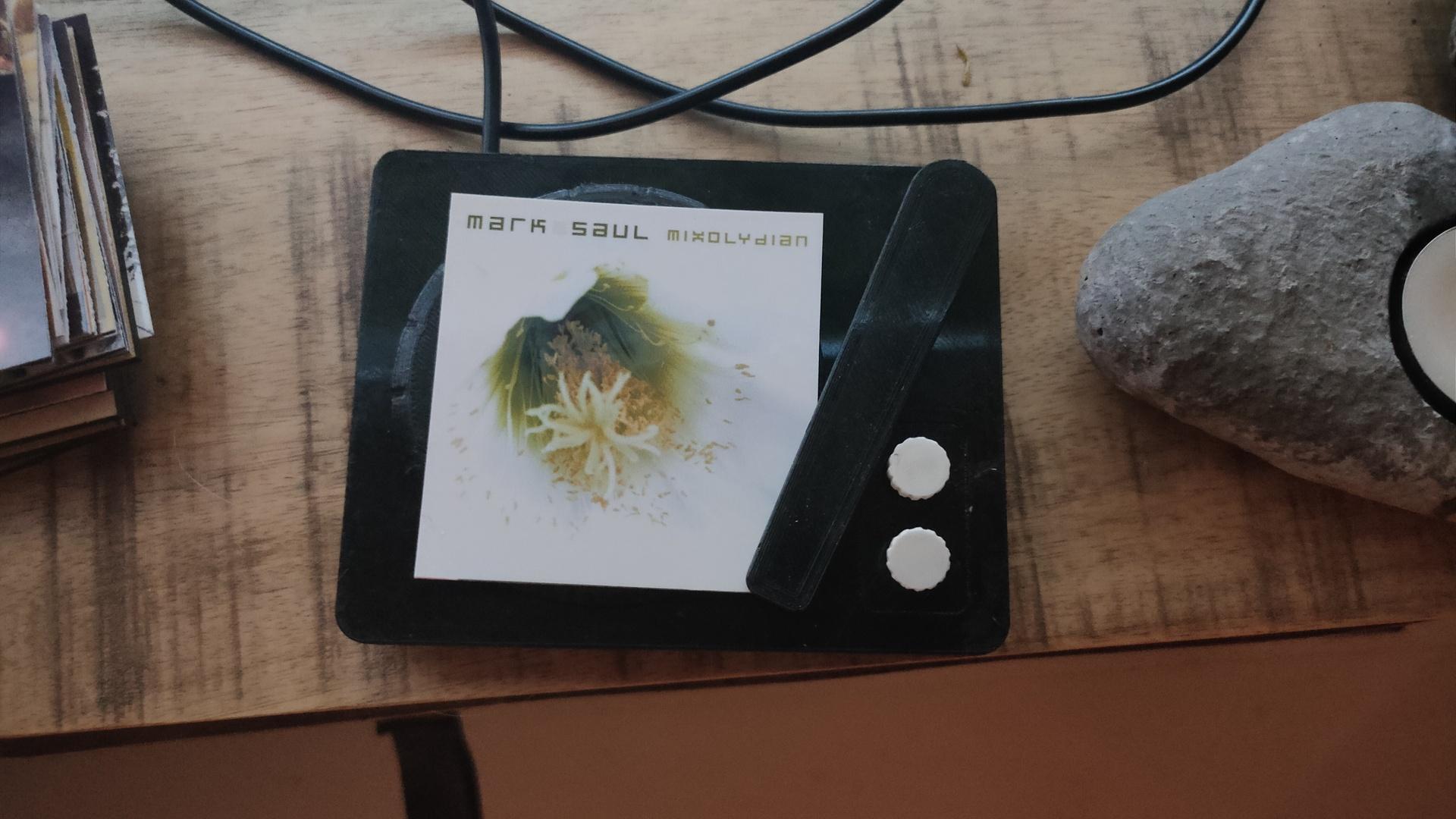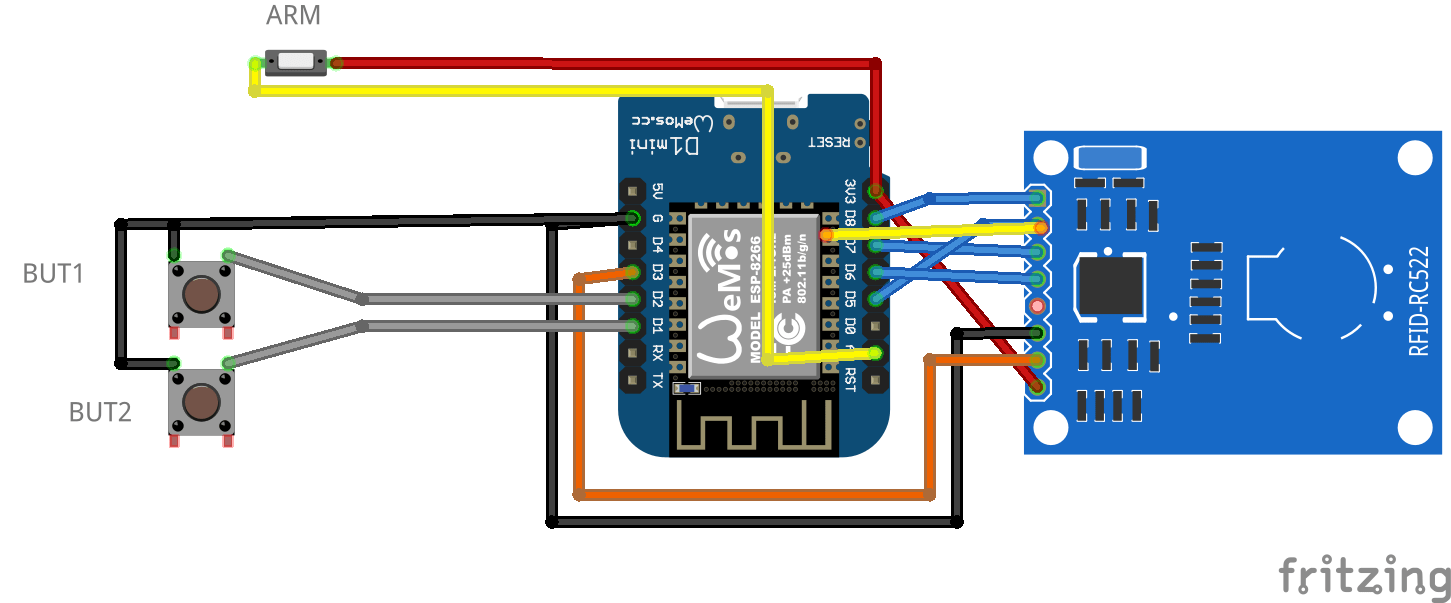Last Updated or created 2024-07-04
But it works! Many iterations .. almost perfect

Record player is going to be re-printed at a higher quality.
- Put a printed image on the player, and it plays the album
- Move the arm, and the next track will be played
- Press upper white button, and the music will pause/resume
- Press lower button … ??? Don’t know yet
Updated python client (see previous posts)
import paho.mqtt.client as mqtt
import urllib.request
from time import sleep
def on_connect(client, userdata, flags, rc): # The callback for when the client connects to the broker
print("Connected with result code {0}".format(str(rc)))
client.subscribe("spotify/rfid/idlms")
client.subscribe("spotify/rfid/but1")
client.subscribe("spotify/rfid/but2")
client.subscribe("spotify/rfid/arm")
def on_message(client, userdata, msg): # The callback for when a PUBLISH message is received from the server.
print("Message received-> " + msg.topic + " " + str(msg.payload)) # Print a received msg
if msg.topic == "spotify/rfid/idlms":
urllib.request.urlopen("http://LMS-SERVER-IP:9000/anyurl?p0=playlistcontrol&p1=album_id:" + msg.payload.decode() + "&p2=cmd:load&player=00:04:20:16:d9:04")
if msg.topic == "spotify/rfid/but1":
urllib.request.urlopen("http://LMS-SERVER-IP:9000/anyurl?p0=pause&player=00:04:20:16:d9:04")
sleep(1)
if msg.topic == "spotify/rfid/but2":
urllib.request.urlopen("http://LMS-SERVER-IP:9000/anyurl?p0=pause&pt=1&player=00:04:20:16:d9:04")
sleep(1)
if msg.topic == "spotify/rfid/arm":
urllib.request.urlopen("http://LMS-SERVER-IP:9000/status.html?p0=button&p1=jump_fwd&player=00:04:20:16:d9:04")
sleep(1)
client = mqtt.Client("lmsclient") # Create instance of client with client ID “digi_mqtt_test”
client.on_connect = on_connect # Define callback function for successful connection
client.on_message = on_message # Define callback function for receipt of a message
client.connect('MQTTSERVER', 1883)
client.loop_forever() # Start daemon
Wemos INO file
#include <Arduino.h>
#include <SPI.h>
#include <MFRC522.h>
#include <ESP8266WiFi.h>
#include <WiFiClient.h>
#include <PubSubClient.h>
#define SS_PIN 15
#define RST_PIN 0
const int buttonPin1 = D1;
const int buttonPin2 = D2;
int buttonState1 = 0;
int buttonState2 = 0;
MFRC522 mfrc522(SS_PIN, RST_PIN);
MFRC522::StatusCode status; //variable to get card status
byte buffer[18]; //data transfer buffer (16+2 bytes data+CRC)
byte size = sizeof(buffer);
uint8_t pageAddr = 0x06; //In this example we will write/read 16 bytes (page 6,7,8 and 9).
//Ultraligth mem = 16 pages. 4 bytes per page.
//Pages 0 to 4 are for special functions.
unsigned long cardId = 0;
WiFiClient net;
PubSubClient client(net);
const char* mqtt_server = "MQTTBROKER";
const char* ssid = "MYSSID";
const char* password = "MYWIFIPASWORD";
String topicStr = "";
byte buffer2[8];
boolean Rflag=false;
int r_len;
char payload[5];
byte value[5];
void setup() {
Serial.begin(9600);
pinMode(buttonPin1, INPUT_PULLUP);
pinMode(buttonPin2, INPUT_PULLUP );
SPI.begin();
mfrc522.PCD_Init();
WiFi.mode(WIFI_AP_STA);
WiFi.begin(ssid, password);
client.setServer(mqtt_server, 1883);
delay(100);
client.setCallback(callback);
delay(100);
client.subscribe("spotify/rfid/in/#");
}
void reconnect() {
while (WiFi.waitForConnectResult() != WL_CONNECTED) {
}
while (!client.connected()) {
String clientId = "rfid-";
clientId += String(random(0xffff), HEX);
if (!client.connect(clientId.c_str(), "rfidclient", "...")) {
delay(5000);
}
}
client.subscribe("spotify/rfid/in/#");
}
void callback(char* topic, byte* payload, unsigned int length) {
Serial.print(F("Called"));
Rflag=true; //will use in main loop
r_len=length; //will use in main loop
int j=0;
for (j;j<length;j++) {
buffer2[j]=payload[j];
//Serial.print((char)payload[j]);
}
if (r_len < 3) {
Rflag=false;
Serial.print(F("Set false"));
}
buffer2[j]='\0'; //terminate string
}
void loop() {
if (!client.connected()) {
reconnect();
}
buttonState1 = digitalRead(buttonPin1);
//Serial.print(buttonState1);
if (buttonState1 == 0 ) {
client.publish("spotify/rfid/but1", "0");
}
buttonState2 = digitalRead(buttonPin2);
//Serial.println(buttonState2);
if (buttonState2 == 0 ) {
client.publish("spotify/rfid/but2", "0");
}
int reading = analogRead(0);
//Serial.println(reading);
if (reading > 500 ) {
client.publish("spotify/rfid/arm", "0");
}
client.loop();
if (!mfrc522.PICC_IsNewCardPresent()) {
return;
}
if (!mfrc522.PICC_ReadCardSerial()) {
return;
}
if (Rflag) {
for (int i=0; i < 4; i++) {
//data is writen in blocks of 4 bytes (4 bytes per page)
status = (MFRC522::StatusCode) mfrc522.MIFARE_Ultralight_Write(pageAddr+i, &buffer2[i*4], 4);
if (status != MFRC522::STATUS_OK) {
return;
}
}
Rflag=false;
}
cardId = getCardId();
char buffer3[10];
sprintf(buffer3, "%lu", cardId);
client.publish("spotify/rfid/id", buffer3);
status = (MFRC522::StatusCode) mfrc522.MIFARE_Read(pageAddr, buffer, &size);
if (status != MFRC522::STATUS_OK) {
Serial.println(F("MIFARE_Read() failed: (R)"));
Serial.println(mfrc522.GetStatusCodeName(status));
return;
}
Serial.println(F("Read data: "));
for (byte i = 0; i < 5; i++) {
Serial.write(buffer[i]);
buffer2[i]=buffer[i];
}
client.publish("spotify/rfid/idlms", buffer,5);
delay(1000);
mfrc522.PICC_HaltA();
}
unsigned long getCardId() {
byte readCard[4];
for (int i = 0; i < 4; i++) {
readCard[i] = mfrc522.uid.uidByte[i];
}
return (unsigned long)readCard[0] << 24
| (unsigned long)readCard[1] << 16
| (unsigned long)readCard[2] << 8
| (unsigned long)readCard[3];
}
